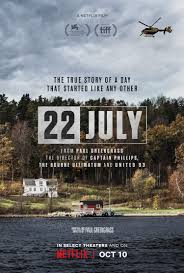22 July
Directed by Paul Greengrass
Written by Paul Greengrass based on “One of Us” by Asne Seierstad
Starring Anders Danielsen Lie, J Jon Øigarden, Thorbjorn Harr, Jonas Strand Gravli, Isak Bakli Aglen, Maria Bock
Paul Greengrass, despite the shaky action camera trademark he has built for himself, is also a man who understands the dramatic narrative. I have not seen “Bloody Sunday”, a film which in most cinephiles estimation is some of his best work. I do know him from his action - filled “Bourne” film series entries, “Supremacy”, “Ultimatum” and the most recent, “Jason Bourne”.
His finest hours have been with intimate stories that are a part of either larger, political dramas or smaller stories, most notably “United 93” and “Captain Phillips”. In his latest film, “22 July”, Greengrass focuses on the dramatic aftermath of the Norwegian extremist attacks of 22 July 2011 in which 77 lives were lost in the twin attacks.
The story based on the story One of Us by Asne Seierstad was adapted by Greengrass, focuses on the trial of extremist, Anders Behring Breivik, played by Anders Danielsen Lie (“Personal Shopper,” “Approaching the Unknown”). The story also focuses on the recovery of one of the victims, Vijar Hanssen (Jonas Strand Gravli).
Greengrass’s filmography prepared him well for this film as the opening of the film focuses on the attacks. There is an urgency to Pal Ulvik Rokseth’s cinematography as Breivik puts the final touches on his homemade explosives. The island of Utoya, where the Labour Party organized a summer camp for future was the site of the second attack, where Breivik mercilessly gunned down innocent youngsters.
Following the attack and the ultimate surrender and arrest of Breivik, is a legal docudrama as Greengrass interweaves Breivik’s attempt to force the government’s hand with the recovery of Viljar, who we see at the opening of the film is a future politician. Greengrass builds Breivik’s case through his legal counsel, Geir Lppestad, played by Jon Øigarden who, reluctantly agrees to defend him despite the strain it puts on his own family.
Breivik’s claim for his actions were that he was insane, which the story tries to build while at the same time, he pushes for putting the country on trial for allowing integration of refugees from other countries into Norway. It was interesting how this story thread, which condemns government immigration practices and its effect on the populace parallels our own struggles here in the United States.
Suddenly, the world feels much smaller.
As the legal drama unfolds, so too does Viljar’s recovery as well as his family’s recovery. His younger brother, Torje (Isak Bakli Aglen) was not injured physically, but mentally. Torje spends the majority of the film in the shadows, it isn’t until Viljar overcomes his own mental anguish that he is able to help Torje, which is an interesting take of the two characters, because that is not the way they start out in the film.
The strongest performance came out of Seda Witt’s Lara, an emigre herself. She is representative of someone who had a political reason to flee her homeland and worked hard to integrate into society. She is a gentle reminder for Viljar to stand strong for himself and for the other victims.
That’s the challenge with this story: we’re so used to Greengrass “the action-drama director” that when we get it, we’re enthralled. When we get into the legal case and the medical stories, they don’t hold the same punch. The lack of punch is attributable to the pacing, some of which could have been trimmed down to eliminate duplicitous story elements. It is a fascinating look at the Norwegian legal system and its similarity to the United States’ process.
The other issue are the characters and their place in the overall story, which is too big to be effective. For a cast who is relatively unknown, they did an excellent job, a hallmark of Greengrass’s experience. Anders Danielsen Lie, Jonas Strand Gravli and Seda Witt. They are the three figures of each of the interwoven stories.
I can only imagine how upset the people of Norway were when these events happened, trying to understand what would have driven someone to do such a dastardly and cowardly event. “22 July” doesn’t necessarily offer answers as much as it does insight into the, now global problems of immigration and people’s rights in each country.
Now streaming worldwide on Netflix and in select theaters.
2.5 out of 4










